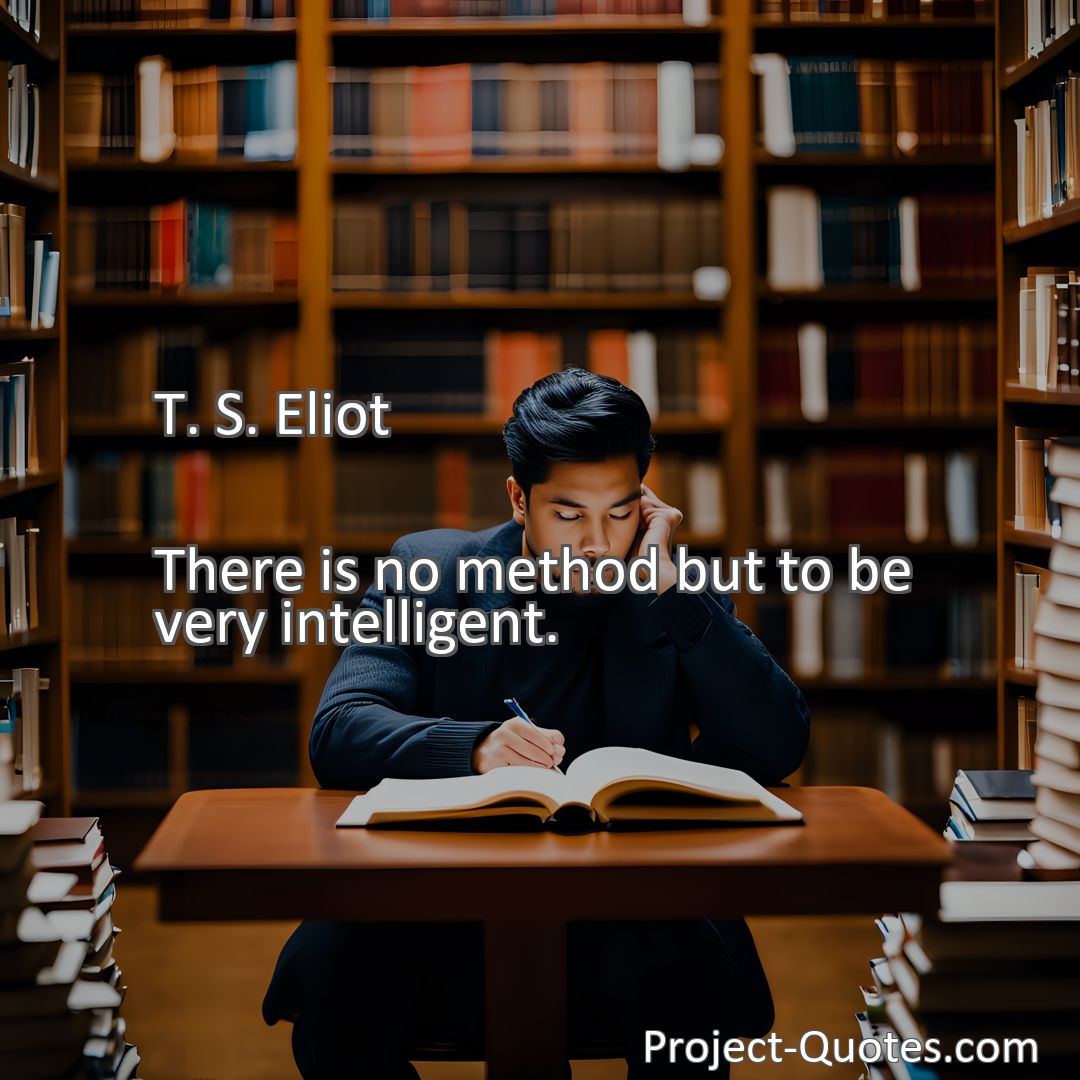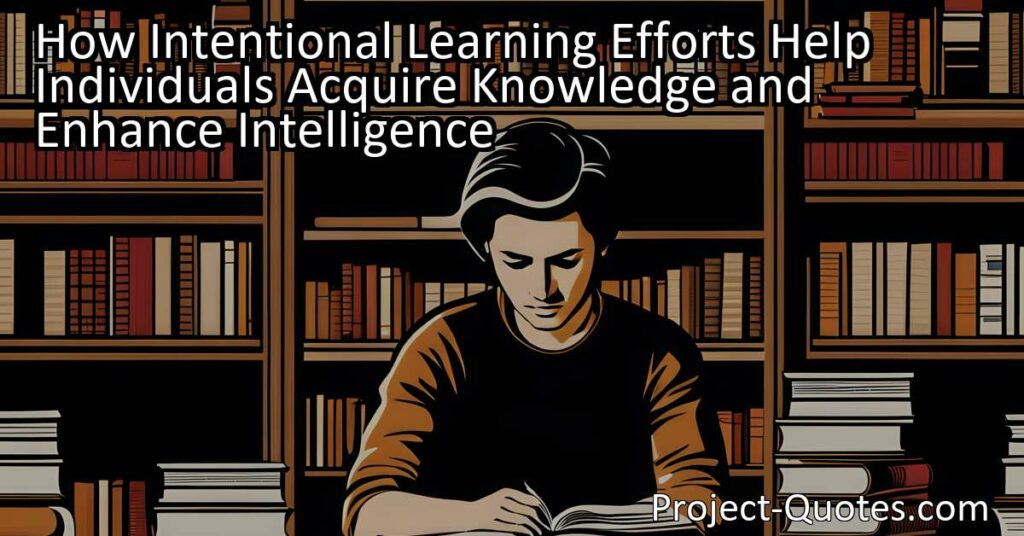There is no method but to be very intelligent.
T. S. Eliot
How Intentional Learning Efforts Help Individuals Acquire Knowledge and Enhance Intelligence Intentional learning efforts play a crucial role in helping individuals acquire knowledge and enhance their intelligence. Through education, self-directed learning, critical thinking exercises, and cultivating curiosity, individuals can expand their intellectual capacity, improve problem-solving skills, and ultimately lead more fulfilling and accomplished lives.
Table of Contents
Meaning of Quote – There is no method but to be very intelligent.
Expanding on the Quote: “There is no method but to be very intelligent”
Intelligence is often regarded as one of the most valued and sought-after qualities in today’s society. It is the ability to analyze, understand, and apply knowledge and information effectively. While intelligence can be developed through various means, it is widely believed that one must possess a certain level of natural intelligence to truly excel. This quote, “There is no method but to be very intelligent,” emphasizes the importance of intelligence and suggests that it is a fundamental requirement for success in any field. In this essay, we will explore the significance of intelligence, ways to enhance it, and the impact it can have on an individual’s personal and professional life.
Firstly, it is crucial to understand that intelligence is not limited to a single aspect or domain of life. Intelligence encompasses several dimensions such as logical-mathematical intelligence (problem-solving and analytical skills), linguistic intelligence (verbal and written communication), spatial intelligence (ability to perceive and manipulate visual information), musical intelligence (aptitude for rhythm and melodies), and interpersonal intelligence (understanding others’ emotions and social dynamics). Each of these dimensions plays a role in shaping an individual’s overall intelligence and can be further developed and nurtured.
While there is a genetic component to intelligence, research has shown that it is not the sole determining factor. Studies indicate that environmental factors, such as access to quality education, stimulating surroundings, and supportive relationships, also contribute significantly to an individual’s intelligence. This implies that intelligence is not a fixed trait but can be enhanced through various methods.
One of the primary ways to enhance intelligence is through education. Education provides individuals with the tools and knowledge necessary to expand their intellectual capacity. By actively engaging in classroom discussions, reading books, and conducting research, students can broaden their understanding of different subjects, improve critical thinking skills, and develop a more comprehensive knowledge base.
Furthermore, continuous learning beyond the classroom setting is also vital for intelligence growth. This can be achieved through self-directed learning, such as reading books, participating in online courses, or pursuing personal interests. Intentional learning efforts help individuals acquire knowledge in areas outside their regular studies, thereby expanding their intellectual capabilities and enhancing their problem-solving skills.
In addition to formal education, critical thinking and problem-solving exercises are effective methods to improve intelligence. Engaging in puzzles, riddles, and brain teasers can sharpen cognitive abilities and enhance mental agility. Such activities encourage individuals to think creatively, come up with innovative solutions, and improve their overall problem-solving skills. Additionally, participating in debates, discussions, and collaborative projects can foster analytical thinking, communication, and teamwork skills, all of which contribute to heightened intelligence.
Another way to enhance intelligence is through the cultivation of curiosity. Curiosity stimulates exploration and a desire to learn, leading to the acquisition of new knowledge and an expanded understanding of the world. Encouraging curiosity through exposure to diverse ideas, promoting a sense of wonder, and fostering a growth mindset can all contribute to the development of intelligence. By questioning assumptions, seeking out new information, and embracing new challenges, individuals can continuously push the boundaries of their knowledge and intellectual capacity.
However, it is essential to note that intelligence should not be equated solely with academic achievements or measured by conventional metrics. Emotional intelligence is an equally important aspect of overall intelligence. Emotional intelligence refers to the ability to recognize, understand, and manage one’s emotions, as well as the emotions of others. It involves self-awareness, empathy, and effective communication skills. Developing emotional intelligence can contribute to better relationships, healthier emotional well-being, and improved decision-making abilities.
Intelligence plays a significant role in an individual’s personal and professional life. In personal relationships, intelligence allows for effective communication, empathy, and understanding of others’ perspectives. It enables individuals to navigate social situations, resolve conflicts, and build meaningful connections. Intelligence also empowers individuals to make informed decisions, handle responsibilities, and navigate life’s challenges with resilience and adaptability.
In the professional sphere, intelligence is highly valued by employers and can significantly impact career prospects. A high level of intelligence enables individuals to excel in various industries and positions that require critical thinking, problem-solving, and knowledge application. Moreover, intelligence contributes to the continuous learning and adaptation required to thrive in an ever-evolving professional landscape. It enables individuals to grasp complex concepts, think outside the box, and contribute innovative ideas to their respective fields.
In conclusion, intelligence is a multifaceted trait that encompasses logical-mathematical, linguistic, spatial, musical, and interpersonal dimensions. While innate intelligence exists, it can be nurtured and enhanced through various methods. Education, continuous learning, critical thinking exercises, cultivating curiosity, and developing emotional intelligence are all effective ways to elevate one’s intelligence. The quote, “There is no method but to be very intelligent,” reinforces the significance of intelligence and highlights its crucial role in personal and professional success. By actively seeking opportunities to enhance our intelligence, we can broaden our knowledge, improve our problem-solving skills, and ultimately lead more fulfilling and accomplished lives.
I hope this quote inspired image brings you hope and peace. Share it with someone who needs it today!


